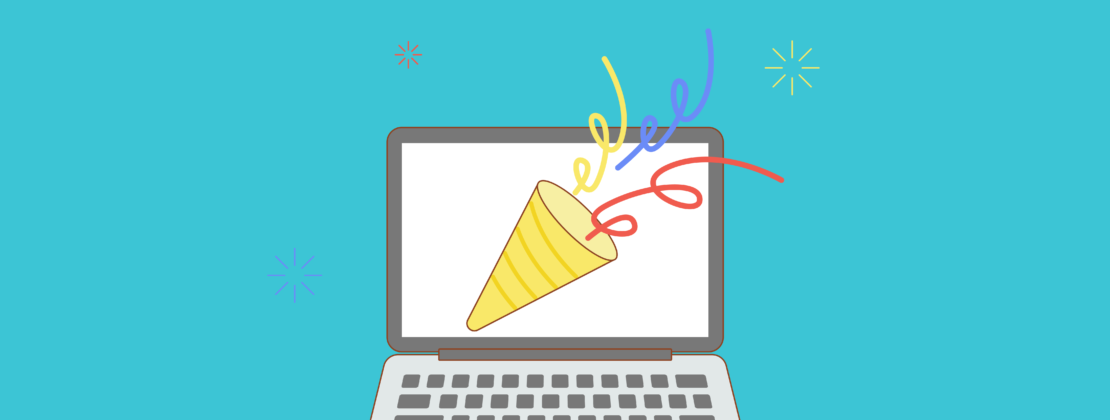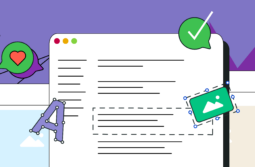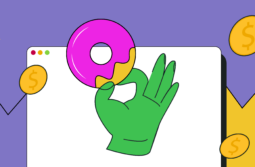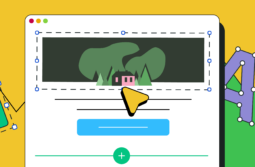You shall not diminish the power of a landing page. That’s one of the crucial things you need to know before starting your event marketing campaign. Let’s say you are hosting an event and decide to avoid designing a landing page. No, the world will not collapse, but the point is, and there is nothing magical about it — your event will fail. Why? Because no one will know where or when it takes place or that it actually does.
No matter how well-planned, atmospheric, or newsworthy your event is, things will go sideways if there is no one there to experience it. Merlin’s beard, so how do you promote your event with landing pages, how do you create them, what are the tricks, and how can you get the hang of it? Don’t worry, one thing at a time.
In this blog post, we will bring you up to speed on everything you need to know about event landing pages and how to benefit from them, so let’s get that ball rolling.
Content:
- What is an event landing page?
- Why your competitors use event landing pages and you should too
- Higher conversion rates
- Increased traffic
- Higher brand exposure
- Event landing page components and structure
- Best practices for designing a killer event landing page
- Alluring headline and CTA
- FOMOing all the way
- Registration made easy
- Showing off your value proposition
- Public approval
- Event landing page examples
- Ungagged
- Web Summit
- #SMWLDN
- ATOMICON
- Savant eCommerce Amsterdam
- To recap
What is an event landing page?
Even the most superb and value-driven products, services, and events do not catch people’s eyes by themselves, and you cannot rely on them to do so. That’s when event landing pages step in.
An event landing page is a standalone web page that teases an upcoming event and aims specifically to motivate potential visitors to register. Regardless of whether it is an online conference or an in-person meetup you’re holding, your event landing page should be a direct reflection of the event and explain why people should come.
The types and features of event landing pages can vary based on the nature of the events you’re holding as well as their media, for example, a webinar landing page, a fundraising event landing page, etc.
However, depending on your specific purpose and desired outcomes, we can distinguish two major types of event landing pages:
- event registration landing pages;
- post-click landing pages.
As evident from the name, an event registration landing page aims to drive sign-ups and reservations or sell tickets. In contrast, post-click landing pages function similarly to lead capture pages by converting visitors into attendees and raising interest.
The key aim of any event landing page is to capture the atmosphere and purpose of an event to help you achieve your conversion goals. A well-versed event marketer can create a landing page that will convey all of that and motivate people to engage with your company.
Although we will provide some excellent event landing page examples later, here is one to give you an idea of how to do it like a pro:
Long story short, event landing pages inform potential visitors about your event’s value, provide details, and encourage them to buy tickets or register. However, the wonders of event landing pages do not cease here, as there is more to what they can bring to your business.
Why your competitors use event landing pages and you should too
Creating anticipation and promoting an awe-inspiring event are not the only things a thoroughly designed event landing page can do. Let’s review some of the reasons to develop one for your event.
Higher conversion rates
Every event landing page focuses on the marketers’ holy grail — conversions. It is one of the essential metrics you measure your event’s success with. An event landing page allows you to share information with incoming traffic and move your visitors through the event’s sales funnel. By creating the most exciting experience for attendees, you can increase registration rates and enable your business to collect data from your leads.
Increased traffic
A compelling event landing page not only promotes your event but drives more traffic to your site. In its turn, it allows you to enhance your search rankings and expose your event to a broader audience. The logic behind this is simple: the more people see your event landing page, the more attendees you will gather.
Higher brand exposure
Organizing and promoting an event provides you with an opportunity to benefit from free marketing with the help of word-of-mouth. This is when you should not be too humble. Your potential visitors might want to tell their friends about you, invite their colleagues to come along, or share your event registration landing page with anyone across their preferred social media channels. Hence, you have to take into account the wow-factor and not forget to highlight your brand’s achievements.
Clearly, event landing pages are not just a humdrum way of informing and inviting people to an event. It requires strategy, clear objectives, and consistency to make it work the way you expect it to. Nevertheless, you need to be aware of some of the basic requirements all event landing pages have before you decide on the approach that is suitable for you.
Event landing page components and structure
A landing page is your alpha and omega when it comes to event marketing — this is where your visitors learn everything they need to know and how they get inspired to actually attend. The structure of your event landing page should be all about igniting curiosity and building realistic expectations.
Your event landing page should provide succinct answers to a few simple questions:
- Who? Who is hosting the event? Who is sponsoring it? Who are the speakers? If you are the host, don’t shy away and briefly outline your company’s goals, why you have the authority to hold the event, and what achievements and experience led you to this moment. In case you are a sponsor or a speaker, explain why you are attending or supporting this event and what value it brings.
- What? What is this event dedicated to? What is its topic? Specify whether you’re discussing something that can be relevant for people with various backgrounds or more of a niche topic that does not ring just any person’s bells. Therefore, your visitors will clearly understand what the event is about, and you can ensure that it lives up to their expectations.
- When and where? When will the event take place? Where or on which online platform is your event being held? You don’t necessarily have to name a particular venue for an offline event, but you need to include the city. The same applies as to when it will happen, meaning that you can mention just the date until you decide on the exact time of your event.
- Why? Why should people come? What’s in there for them? Ensure that the value of your event, benefits or opportunities that it brings, special guests, or any other aspect that makes you stand out does not leave any doubts as to why someone should attend.
- How? How can people register or buy the tickets? Your effort and time spent may go to waste if you don’t include a few excellent calls to action. Make sure that the navigation to your event registration landing page is seamless and that it does not take ages to get to one of your CTAs through all the information.
Best practices for designing a killer event landing page
Sure, now you get what you need to have in your event landing page to make it informative and concise, but how do you make it effective? We have prepared a few tricks for you to have up your sleeve to ensure that your landing pages make you profit.
Alluring headline and CTA
Remember that saying, “looks are deceiving”? Yeah, no one will think that when looking at a poorly designed and stodgy event landing page. Looks and first impressions are everything for an event marketer, so you need to pay extra attention to the first and last thing your visitors will see.
Here is how Superweek, a digital marketing conference, catches their visitors’ attention with a minimalistic yet captivating headline and CTA on their event landing page:
Your headline and CTAs have to resonate with your audience deeply. Think about what you could mention in your headline to spark your visitors’ enthusiasm instantly and what you need in your CTA to finish them off. Don’t forget to create an atmosphere of urgency by using the imperative mood and keeping a tone that is favorable to your target audience.
FOMOing all the way
Yes, it’s absolutely real. A recent psychological study claims that approximately 55% of adolescents experience FOMO while using social media. Although you should use this for your benefit when developing an event landing page, create more anticipation and enthusiasm than negative associations and distress.
Anything can create that excitement and can’t-miss joy, starting from a catchy headline and CTAs to sneak peeks of some of your prominent and respected speakers or venue, immersive graphics, and a masterfully written rundown of your event’s key talking points.
What can convince visitors to stay on your event landing page and attend even more is a few humble but effective event reminders that will nurture them and improve their overall event experience.
Registration made easy
The simpler, the better. A successful event registration landing page needs to be intuitive, graphically appealing, and user-friendly. However, a simple registration flow does not mean a carefree and straightforward process of its development.
Here is how the team of IBTM World, an offline reunion of event planners, organized their event registration landing page to be accessible and effective:
Clearly, developing a registration form consistent with your brand’s style, goals, and values might require lots of your time. But, fear not! You can use a landing page builder to create a responsive event registration landing page without writing a single line of code. Taking this step enables you to create a customized landing page, promote it, and add a registration form or a multi-channel subscription widget to increase your event exposure.
Showing off your value proposition
A value proposition is a primary reason that makes visitors attend a particular event. This is what you might want to mention in the “who” and “why” parts of your event landing page. How can you do it? By staying focused on the benefits and quality you offer and not hesitating to get specific about it.
You can offer visitors to see for themselves why you are qualified to hold the event, provide attendees’ reviews and testimonials from your previous events, and focus on a clear call to action. This way, your value proposition will not need any further validation.
Public approval
Captivating headlines, FOMO, and stunning visuals will definitely lure visitors into staying on your event landing page, but sometimes you need a final push to get them to actually come. That’s why having well-respected attendees on your side for back-patting and enhancing your brand’s and event’s reputation is never a bad idea.
Do not just tell visitors how great your event is — let your sponsors, speakers, or guests do it. Hence, you can demonstrate that you don’t just toot your own horn, gain public trust, and prove the value your event provides.
Event landing page examples
You’re almost there and ready to create. Now it’s time to see how to implement all of these strategies in practice. Here we will provide some of the best event landing page examples for you to get inspired from.
Ungagged
This is one of the sharpest event landing page examples that demonstrates how to create urgency. Ungagged London is an offline conference that invites digital marketers to talk about SEO, SEM, PPC, analytics, link building, and much more. Their landing page includes a countdown until the date of the event and briefly outlines the essential details, namely the “when & where” element.
Visuals and graphic design prevail over text here, which is the way to go if you want to captivate your visitors.
Web Summit
Web Summit is a tech conference that gathers CEOs from fast-growing startups, policymakers, and tech companies to discuss current affairs and the future of their industry. Their landing page can teach you how to increase your event’s credibility and validate your value proposition. Web Summit’s event landing page includes a list of prominent speakers and names of companies like Google, Siemens, Huawei, and many others that attend their conference.
They don’t even need to restate the idea of this presentation because it speaks for itself and creates an impression of a company that is experienced and accomplished.
#SMWLDN
#SMWLDN (Social Media Week London) is a virtual event for social media marketers where publishers, agencies, and brand leaders share their insights on how to reinvent marketing in a constantly moving world. This summit can serve as one of the event landing page examples for you to learn how to build up visitors’ expectations.
This event landing page includes a visual representation of Social Media Week’s annual topic and provides a shout-out to the event’s sponsors and testimonials. It is an excellent approach that ensures that visitors know what to expect and increases their anticipation.
ATOMICON
ATOMICON is a conference for small business owners that covers the topics of sales tactics, growth strategies, and digital marketing. The design of this landing page lives up to the event’s name by using bright, atomic colors and fonts and including high-quality pictures.
ATOMICON’s event landing page includes several CTAs that offer to get a 50% discount on their tickets, creating a sense of urgency. If your goal is to increase conversions, sales, and registrations, then this strategy is just for you as well.
Savant eCommerce Amsterdam
Savant eCommerce Amsterdam is a conference that gathers the Netherlands’ leading retailers to discuss the future of the eCommerce community and reunite in person. This is one of the event landing page examples that can demonstrate how to appeal to visitors with the help of social proof.
Coming back to our section with best practices, this is the way to gain public approval in action. The company implements statistics and provides detailed information about the speakers to illustrate the authority of their event.
To recap
One thing is clear: there is more to event landing pages than it seems at first glance. Developing and designing one might take up a lot of time and be challenging if you aim to ensure visitors’ smooth and premium experience.
If it feels like you have too much on your plate already — that’s where we’ve got you. With the help of our landing page builder, you will enjoy the view of your new event landing page in just as little as 15 minutes. Moreover, you can start getting more traffic and increase your registration rate by including multiple links, setting up auto-replies, and promoting it from a single platform. Try it for free and see for yourself.









